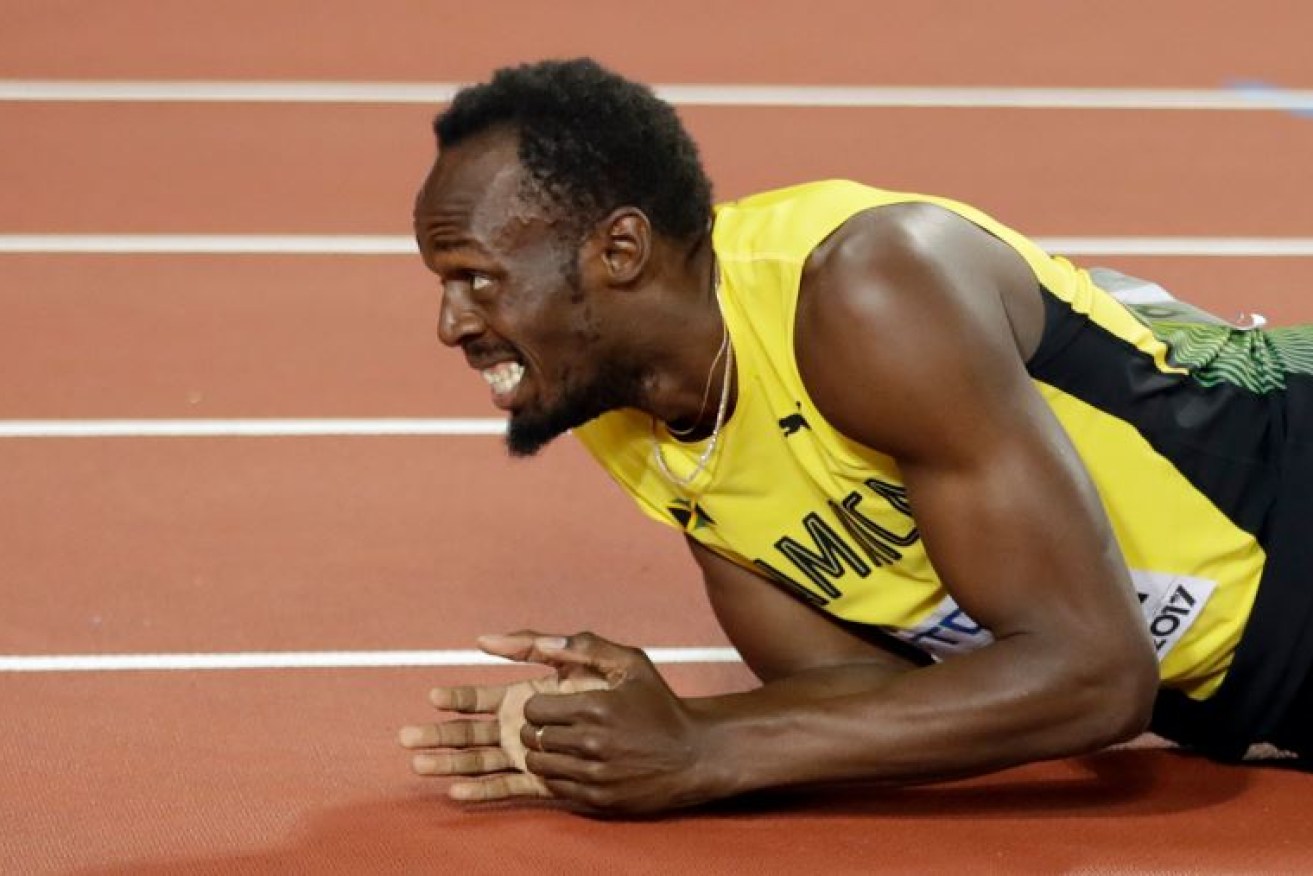Usain Bolt’s ageing legs let him down in his last and final race

Usain Bolt grimaces in pain after hobbling across the finishing line, crippled by a ruptured hamstring in the home stretch. AP / Matthias Schrader
Life after Usain Bolt has begun.
The Jamaican great brought the curtain down on his glittering career by limping across the line, his athletic prowess crippled by a blown-out hamstring, injured in the 4×100 metres relay at the world athletics championships in London.
For a man who has won 19 global titles, who has transformed athletics, it was a sorry way to go. But dramatic too. And Bolt does drama in big time.
Nine years after exploding onto the world stage with two jaw-dropping world records at the Beijing Olympics, five after he declared himself a “living legend” by retaining his titles in London, and one after lighting up yet another Games in Rio, Bolt waved goodbye to the crowd as he hobbled down the home straight at the London Stadium.

Usain Bolt, in yellow, falls behind the field after blowing out his hamstring in the final appearance of his glittering career.
The greatest career athletics has even seen − over. But the 30-year-old was so much more than a medal machine.
The saviour of athletics: it is a tag Bolt has lived with through the dark days of doping scandals during which it sometimes seemed that only he could keep the sport from going under.
The task of how to fill the void his departure will leave is a gargantuan one.
Bolt appeared destined for greatness since becoming, aged 15 in 2002, the youngest world junior champion by taking 200m gold on home soil in Kingston.
If that set the teenager from Trelawny on the road to stardom, his performances at the Beijing Olympics six years later sealed it.
Fuelled by a diet of chicken nuggets, he set a 100m world record of 9.69, despite celebrating well before crossing the line, spreading his arms and slapping his chest.
International Olympic Committee president Jacques Rogge branded his showboating disrespectful. He could not have been more out of touch.
Here was a man to take athletics into a new stratosphere.
The following year he set world records − 9.58secs over 100m, 19.19s over 200m − which look set to stand for years.
They were mind-boggling marks from a sprinter who looked different too.
At 198cm he towered over his rivals and, once he had recovered from his always troublesome start, his speed was awesome.
But it has always been about so much more than the race with Bolt. It is the whole show. He has made athletics fun like no one else.
Be it his dancing, his joking, his celebrating, his ‘Lightning Bolt’ pose − no one does it better.
Energy, excitement, humour, charisma − it is all there, even in the briefest of moments.
Sprinters of the past used to prowl around the start line, sporting their best menacing looks, before a race. Bolt has made them all look just a little bit foolish.
Bolt has, somehow, managed to tread the line between arrogance and humility exactly right.
He knows he is special and he is not afraid to say it.
But he is also aware of his responsibility to the sport, particularly in an age of repeated doping scandals, and when his biggest rival, Justin Gatlin, is a two-time drug cheat.
Bolt has been directly affected by doping. He is no longer a nine-time Olympic champion, having lost his 4x100m gold from the 2008 Olympics when teammate Nesta Carter failed a retrospective drugs test.
That fact will not affect his legacy, though.
Nor will the fact he had to settle for 100m bronze, behind champion Gatlin and young American Christian Coleman, in the 100m in London, the final individual race of his career.
His hero status is secure.
-AAP








